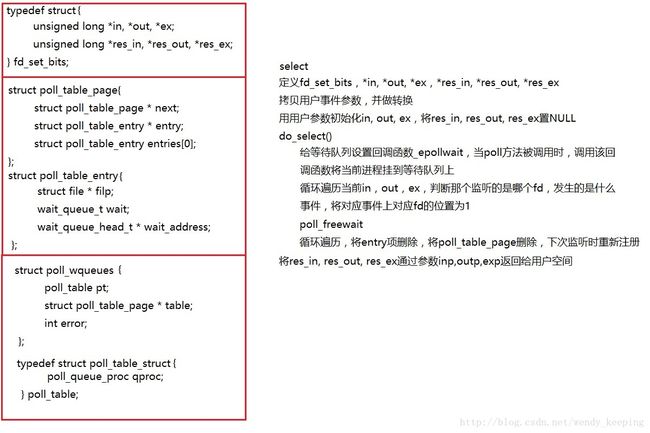select源码剖析
select只有一个系统调用
select(int nfds, fd_set *readfds, fd_set *writefds, fd_set *expectfds, struct timeval *timeout);
nfds指定被监听文件描述符的总数,一般为socket监听的所有文件描述符中的最大值+1。
readfds, writefds, expectfds分别指向可读可写异常事件的文件描述符集合,应用程序调用select时,将这些参数传给内核空间,内核保存用户想监听的事件,当监听的fd上有事件发生后,内核通过修改这些参数告知应用程序哪些已经就绪。每次再调用select时都要重新设置readfds, writefds, expectfds,因为文件描述符集合被内核修改了。
timeout参数设置select函数的超时时间,提供了秒和微秒的事件单位。如果是0,则select立刻返回。如果是NULL,select将一直阻塞,直到某个文件描述符上有时间发生。
select中重要的数据结构fd_set_bits,poll_table_page,poll_tablle_entry,poll_wqueues。
以下是select的源码,重要的地方我都做了注释,相信大家可以看懂
typedef struct
{
unsigned long *in, *out, *ex;
unsigned long *res_in, *res_out, *res_ex;
}fd_set_bits;asmlinkage long sys_select(int n, fd_set __user *inp, fd_set __user *outp, fd_set __user *exp, struct timeval __user *tvp)
{
fd_set_bits fds;
char *bits;
long timeout;
int ret, size, max_fdset;
//将用户的等待事件拷贝到内核态
timeout = MAX_SCHEDULE_TIMEOUT;
if (tvp) {
time_t sec, usec;
if ((ret = verify_area(VERIFY_READ, tvp, sizeof(*tvp)))
|| (ret = __get_user(sec, &tvp->tv_sec))
|| (ret = __get_user(usec, &tvp->tv_usec)))
goto out_nofds;
ret = -EINVAL;
if (sec < 0 || usec < 0)
goto out_nofds;
//进行单位换算
if ((unsigned long) sec < MAX_SELECT_SECONDS) {
timeout = ROUND_UP(usec, 1000000/HZ);
timeout += sec * (unsigned long) HZ;
}
}
ret = -EINVAL;
if (n < 0)
goto out_nofds;
/* max_fdset can increase, so grab it once to avoid race */
max_fdset = current->files->max_fdset;
if (n > max_fdset)
n = max_fdset;
/*
* We need 6 bitmaps (in/out/ex for both incoming and outgoing),
* since we used fdset we need to allocate memory in units of
* long-words.
*/
ret = -ENOMEM;
size = FDS_BYTES(n);
//为内核的fd_set_bits申请空间并初始化
bits = select_bits_alloc(size);
if (!bits)
goto out_nofds;
fds.in = (unsigned long *) bits;
fds.out = (unsigned long *) (bits + size);
fds.ex = (unsigned long *) (bits + 2*size);
fds.res_in = (unsigned long *) (bits + 3*size);
fds.res_out = (unsigned long *) (bits + 4*size);
fds.res_ex = (unsigned long *) (bits + 5*size);
//拷贝用户空间感兴趣的事件
if ((ret = get_fd_set(n, inp, fds.in)) ||
(ret = get_fd_set(n, outp, fds.out)) ||
(ret = get_fd_set(n, exp, fds.ex)))
goto out;
//清空存放事件的位数组
zero_fd_set(n, fds.res_in);
zero_fd_set(n, fds.res_out);
zero_fd_set(n, fds.res_ex);
//监听用户感兴趣的事件
ret = do_select(n, &fds, &timeout);
if (tvp && !(current->personality & STICKY_TIMEOUTS)) {
time_t sec = 0, usec = 0;
if (timeout) {
sec = timeout / HZ;
usec = timeout % HZ;
usec *= (1000000/HZ);
}
put_user(sec, &tvp->tv_sec);
put_user(usec, &tvp->tv_usec);
}
if (ret < 0)
goto out;
if (!ret) {
ret = -ERESTARTNOHAND;
if (signal_pending(current))
goto out;
ret = 0;
}
//将存放事件结果的位数组拷贝给用户参数位数组,通过修改用户传进来的位数组将事件返回给用户
if (set_fd_set(n, inp, fds.res_in) ||
set_fd_set(n, outp, fds.res_out) ||
set_fd_set(n, exp, fds.res_ex))
ret = -EFAULT;
out:
select_bits_free(bits, size);
out_nofds:
return ret;
}int do_select(int n, fd_set_bits *fds, long *timeout)
{
struct poll_wqueues table;
poll_table *wait;
int retval, i;
long __timeout = *timeout;
spin_lock(¤t->files->file_lock);
retval = max_select_fd(n, fds);
spin_unlock(¤t->files->file_lock);
if (retval < 0)
return retval;
n = retval;
//设置回调函数,该回调函数将当前进程挂到等待对队中
poll_initwait(&table);
wait = &table.pt;
if (!__timeout)
wait = NULL;
retval = 0;
for (;;) {
unsigned long *rinp, *routp, *rexp, *inp, *outp, *exp;
set_current_state(TASK_INTERRUPTIBLE);
inp = fds->in; outp = fds->out; exp = fds->ex;
rinp = fds->res_in; routp = fds->res_out; rexp = fds->res_ex;
for (i = 0; i < n; ++rinp, ++routp, ++rexp) {
unsigned long in, out, ex, all_bits, bit = 1, mask, j;
unsigned long res_in = 0, res_out = 0, res_ex = 0;
struct file_operations *f_op = NULL;
struct file *file = NULL;
in = *inp++; out = *outp++; ex = *exp++;
all_bits = in | out | ex;
if (all_bits == 0) {
i += __NFDBITS;
continue;
}
for (j = 0; j < __NFDBITS; ++j, ++i, bit <<= 1) {
if (i >= n)
break;
if (!(bit & all_bits))
continue;
file = fget(i);
if (file) {
f_op = file->f_op;
mask = DEFAULT_POLLMASK;
if (f_op && f_op->poll)
//调用回调函数,为每一个fd分配一个poll_table_page,用来保存当前fd监听的事件
mask = (*f_op->poll)(file, retval ? NULL : wait);
fput(file);
//判断当前fd是否有事件发生,然后设置事件返回位数组
if ((mask & POLLIN_SET) && (in & bit)) {
res_in |= bit;
retval++;
}
if ((mask & POLLOUT_SET) && (out & bit)) {
res_out |= bit;
retval++;
}
if ((mask & POLLEX_SET) && (ex & bit)) {
res_ex |= bit;
retval++;
}
}
cond_resched();
}
//将返回事件位数组的值拷贝给传进来的参数
if (res_in)
*rinp = res_in;
if (res_out)
*routp = res_out;
if (res_ex)
*rexp = res_ex;
}
wait = NULL;
if (retval || !__timeout || signal_pending(current))
break;
if(table.error) {
retval = table.error;
break;
}
__timeout = schedule_timeout(__timeout);
}
__set_current_state(TASK_RUNNING);
//删除fd的poll_table_page
poll_freewait(&table);
*timeout = __timeout;
return retval;
}
select的事件处理就说到这儿,留下几个问题,也是面试中常问的问题:
1.select和epoll有什么不同?
2.为什么epoll比select高效?
3.不论哪种情况,epoll永远比select高效吗?
